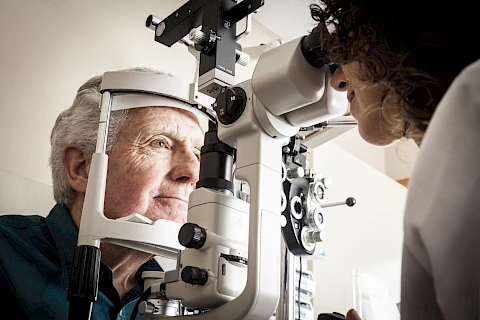
Vision is a precious gift that can significantly decline with age. From struggling to read fine print to difficulty recognizing loved ones, eye problems can dramatically impact a senior's quality of life. Our caregivers want to shed light on common eye conditions affecting older adults and encourage regular eye exams to protect and preserve your vision.
Cataracts
Cataracts develop when the clear lens of your eye becomes cloudy, hindering your vision. While primarily associated with aging, factors such as diabetes and smoking can accelerate their formation. Over time, cataracts can significantly reduce your ability to see clearly.
Have you noticed any of these changes in your vision?
- Blurred or cloudy vision: Objects may appear hazy or fuzzy.
- Nighttime difficulties: Driving at night or seeing in low light becomes challenging.
- Increased sensitivity: Lights may seem brighter or cause discomfort.
If you experience these symptoms, consult an eye care professional for a comprehensive exam.
Glaucoma
Glaucoma is a serious eye condition that gradually damages your optic nerve, often due to increased pressure within the eye. There are different types of glaucoma, each with its characteristics. Early detection is essential to prevent irreversible vision loss.
While glaucoma often develops without noticeable symptoms, be aware of these potential warning signs:
- Peripheral vision loss: Difficulty seeing objects on the sides of your vision.
- Halos: Seeing rainbow-colored circles around lights.
- Eye pain or pressure: Discomfort or feeling fullness in your eye.
These symptoms might be subtle, so regular comprehensive eye exams are crucial for early diagnosis and treatment.
Age-Related Macular Degeneration (AMD)
Age-related macular degeneration (AMD) affects the macula, the central part of your retina responsible for sharp, detailed vision. Primarily caused by aging, AMD can significantly impact daily activities if left untreated.
Pay attention to these potential indicators of AMD:
- Blurred or distorted central vision: Objects may appear hazy or have wavy edges.
- Difficulty with facial recognition: Challenges recognizing familiar faces.
- Straight lines appearing wavy: Lines may seem bent or crooked.
Early detection is crucial for effectively managing AMD. If you notice any of these changes, consult an eye care professional promptly.
Diabetic Retinopathy
Diabetic retinopathy is a serious eye condition caused by diabetes. It damages the blood vessels in the retina and can lead to severe vision loss or even blindness if left untreated.
If you have diabetes, it's crucial to watch for these potential signs of diabetic retinopathy:
- Floaters or dark spots: These are specks or shadows that seem to drift across your vision.
- Blurred vision: Difficulty seeing clearly or having a hazy vision.
- Color vision changes: Trouble distinguishing between colors or seeing colors differently.
Regular eye exams are essential for people with diabetes, as early detection and treatment can significantly reduce the risk of vision loss.
How Are You Caring for Your Eyes?
Early detection is key to preserving your vision. Recognizing the early signs of common eye conditions can significantly impact your quality of life. Regular eye exams are essential for maintaining good eye health.
If you're a senior living in Valparaiso, Portage, Westville, Michigan City, or Lake County, Senior Helpers Chesterton is here to assist you with your eye health and overall well-being. Let us support you in taking proactive steps to protect your vision for years. Contact us today.